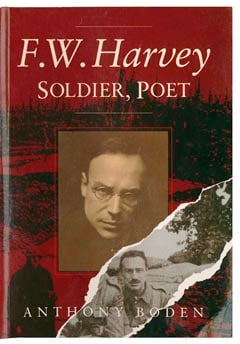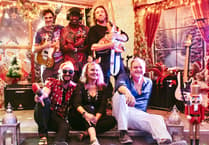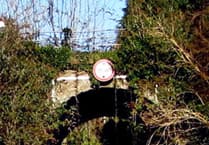The Yorkley solicitor dubbed "the Forest Poet" and "the Laureate of Gloucestershire" is to be commemorated with a Society of his very own. Yorkleyites and associates are launching an F W Harvey Society next week.
F W (Will) Harvey (1888-1957), friend of famous Gloucestershire war poet Ivor Gurney (1890-1947) and Lydney-born composer Herbert Howells (1892-1983), is being celebrated by admirers and descendants including several grandchildren.
The Yorkley house he lived in from 1927 till his death in 1957, aged 69, remains in family hands. Lived in by son Patrick until his death, it is undergoing refurbishment.
Society secretary is Marie Fraser Griffiths, whom we recently met in her role as spokeswoman for the Yorkley-based Forest Brass band. She has been working on the launch with Oldcroft's Roger Deeks of Neds Tops, amateur World War I historian.
"We met through the brass band," Marie explains. "My husband Bryan plays 2 second cornet, and Roger's wife is Amanda Deeks who plays solo horn. We also have on our initial committee Yorkley's David Adams and Steve Cooper – chair of the Forest of Dean Branch of the Gloucestershire Family History Society."
The launch coincides with the republication by Forest Bookshop proprietor Doug McLean of Harvey's Collected Poems 1912-1957 (Douglas McLean Publishing 1983; 2009 £9.99). The collection includes some 30 poems unpublished in his own time.
*****
Born in Hartpury in 1888, Will moved with his family to The Redlands farmhouse on the Minsterworth main road opposite the Apple Tree Inn, aged two. His father (died 1909) was a prosperous farmer and Harvey grew up in rustic but comfortable surroundings.
The eldest of four brothers and one sister, he didn't go to school until he was nine. Influenced by the St Peter's parish church vicar, his poetry has many Christian and spiritual themes.
After leaving school, and articled to a Gloucester solicitor from 1906, he encountered Ivor Gurney and Herbert Howells, both pupils at the Cathedral choir school. The trio roamed the countryside, talking of poetry and music, until studies scattered them.
After an operation to remove a gland in Gloucester Royal Infirmary in 1913, Will was tended by Irish trainee nurse Anne Kane. Before he left for his first job in Chesterfield, it appears he may have proposed – and been accepted.
Then war. Now aged 26, Harvey signed up with the Glosters as a private. Gurney was initially not accepted because of his poor eyesight, but standards were lowered two years later. Howells was wholly unfit.
"Three of the four brothers enlisted in the army on the same day," notes Anthony Boden in F W Harvey – Soldier, Poet (Sutton Publishing, 1988; revised edition 1998). The lavishly illustrated biography includes many of Will's poems set in context.
After a career in the RAF medical service, Boden was Administrator of the Three Choirs Festival in Gloucester 1989-1999, and in 1995 was founding chairman of the Ivor Gurney Society. He is among speakers visiting the Forest during the society's launch year.
As the others marched to war, the youngest Harvey son, Bernard, was left behind to help his widowed mother on the farm. He was killed that year on his motorbike on the (deadly even then) Minsterworth road.
Perhaps surprisingly, Will Harvey was a dedicated soldier – having been one of the first Territorials to be sent to France.
"As a Lance-Corporal he was awarded the Distinguished Conduct Medal for 'conspicuous gallantry' and was commissioned as a lieutenant shortly afterwards," Boden writes.
"He survived the Somme offensive, but in August 1916 was captured by the Germans while reconnoitring alone behind enemy lines. He spent the rest of the war in prisoner-of-war camps – more than two years of spirit-sapping demoralisation made bearable only by comradeship, faith and the humour which he saw as an act of courage, and punctuated by heroic escape attempts."
Writing for a camp newsletter, he continued scribbling poetry. As with others, wartime surroundings heightened memories of home. His captors having allowed him to send his poems home, they were first published as A Gloucestershire Lad At Home and Abroad (Sidgwick and Jackson, 1916)
"By the time he arrived at Crefeld Camp in March 1917, he had the satisfaction of knowing that A Gloucestershire Lad was a huge success, having already gone into a fourth edition," Boden notes. Crefeld was just one of Will's many "cages" as described in his memoir Comrades in Captivity: a record of life in seven German prison camps (1919).
During a failed escape attempt from the next, Schwarmstedt, the first of his comrades out of the tunnel was shot dead by a guard at pointblank range. Will jumped from the train taking him to the Holzminden camp but was quickly captured by local peasantry.
A Holzminden photo shows him heavily bearded but already balding – and, understandably, somewhat disgruntled
"One day he noticed a fellow prisoner had chalked on the wall opposite to him a sketch of a reedy village pond with ducks swimming on it," the late Dr Bill Tandy writes in his newly republished memoirs A Doctor in the Forest (Douglas McLean, £7.99).
"Harvey got out paper and pencil and wrote what is his best known poem – 'Ducks'," Tandy continues in a lengthy reminiscence of the patient he first encountered in his Parkend surgery in 1940 and who became a close friend. Gloucestershire Friends: Poems from a German Prison Camp having been published in 1917, the volume headed by Ducks appeared in 1919 – the year Will returned home.
"His brother, Captain F Harvey, MC and bar, of his own regiment, [had been] killed in action within one week of the end of the war," Tandy poignantly notes.
*****
Will resumed his solicitor's life. Bound by the terms of his indentures not to work within 3- miles of Gloucester, he found a post in Swindon. Here in April 1921 he and Anne Kane were married – their first child, Eileen, being born there in 1922.
At the end of the year, his Articles completed, he was given a job by John Haines of Newnham-on-Severn, himself an amateur poet. Will and family were accommodated in The Redlands, before renting a riverside "cottage" – a pair of converted railway carriages - at Broadoak, upstream of Newnham.
Their son Patrick was born there in 1925 – the year of his last collection of poems for two decades. His fourth volume Farewell had appeared in 1921, the fifth being September and Other Poems.
This latter was "his work of greatest maturity," Boden notes. "This was a time in which Harvey's Gloucestershire idylls matched the nostalgic mood of people yearning for a return to the apparent quiet prosperity of pre-war days.
"The mood did not last, and one by one the books went out of print. No new work was published till 1947, a selection under the title Gloucestershire."
*****
"In 1927 the landlord of a local pub had told Will about a stone-built, four-square house with a walled garden which had come up for sale at Yorkley and from which there were views of the 'forest and vale and high blue hill'," Anthony Boden records.
"With the help of Anne's hard-earned savings the couple bought the property and, for the first time, set up home permanently.
"More and more he left the routine work of the office to his clerk, Harold Brown, whilst he wandered into the woodlands to find spiritual strength and release from stress. Ten years later, Will closed the Lydney office and withdrew to his Forest retreat, where he put up a brass plate."
In the years to come, Will became a regular fixture at the Bailey Inn just across the road.
"It is clear that that the drinking of beer had, in 1921, attained a position of major importance for him, far above that of a social lubricant," Boden the medic observes.
Tandy, another medical man, provides his observations from later years. "People came to Harvey with their troubles and problems. He represented them in the courts when necessary, even though his clients were sometimes unable to pay his fees. His needs were simple and uncomplicated. He never owned a car.
"His years in the prisoners of war camp had inflicted psychic trauma from which he never really recovered. He had been permanently scarred.
"Strangers enjoyed meeting him in the pubs when they were on holiday, finding that he added a new dimension to their lives by his company, manner and his charm. Yet all that abounding energy was beginning to dry up.
"Harvey's frequent visits to the local pubs earned him the reputation of being a drinker. All I can say is that I never once saw him the worse for drink.
"During the last ten years of his life his health gradually failed. Added to this were his money problems."
The last collection of his poems during his lifetime was published by Oliver and Boyd in 1947 titled simply Gloucestershire. Yet he was remembered from poems included in various anthologies both before and after his death in 1957 at his Yorkley home aged 69.
Always unpompous, when told that Germans faced having to translate 'Ducks' into German during their schooldays, he commented: "Serves the Germans right."
The inaugural event on Sunday January 31, at 2pm in Yorkley's Memorial Hall on Sunday is to be attended by Anthony Boden.
"Patrick's sister Eileen Griffiths, who lives in Gloucester, and her daughter Elaine Jackson are hopefully coming," says Marie.
Next week: Harvey Society details.




Comments
This article has no comments yet. Be the first to leave a comment.